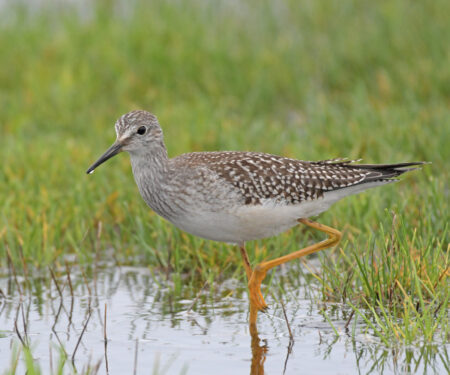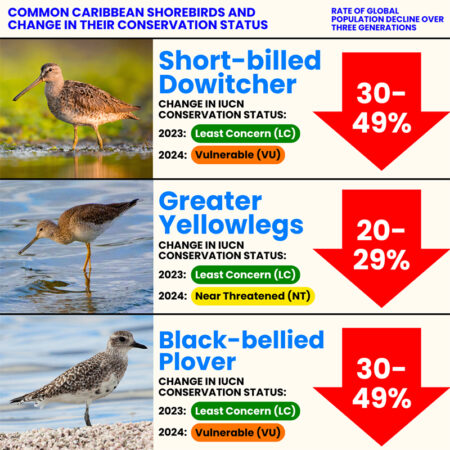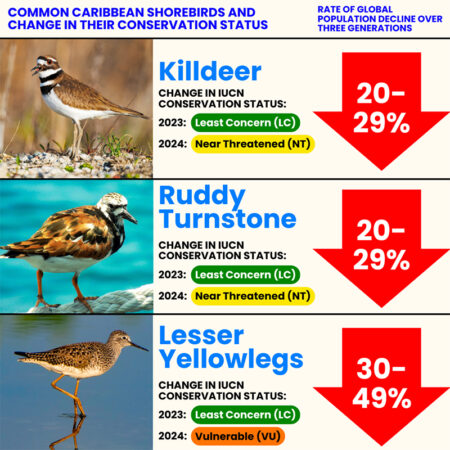
CLICK HERE TO SUPPORT SHOREBIRD CONSERVATION IN THE CARIBBEAN
BirdsCaribbean is sounding the alarm over the significant declines in shorebird populations, highlighted in a recent update to the International Union for the Conservation of Nature (IUCN) Red List. The report, released during the COP16 UN Biodiversity Conference in November, reveals that 16 shorebird species have been moved to higher threat categories, with some populations plummeting by least 30% over the past three generations.
“This is a wake-up call,” said Lisa Sorenson, Executive Director of BirdsCaribbean. “The Caribbean is a lifeline for migratory shorebirds, providing critical stopover and wintering sites along the Atlantic Flyway. When these habitats are lost or degraded, or disappear, these birds face severe challenges.”
Many of the reclassified species are familiar visitors to the Caribbean, reflecting the region’s vital role in their life cycles. Among the newly listed species are the Lesser Yellowlegs, now classified as “Vulnerable,” and the Greater Yellowlegs, listed as “Near Threatened.” Other widespread species like the Ruddy Turnstone are also in decline, facing threats such as habitat loss, disturbance, and climate change-related impacts. The Short-billed Dowitcher has also experienced worrying population declines.
The Role of Coastal Habitats
Coastal wetlands, including mangroves, swamps, ponds, beaches, sand flats, and mud flats, are essential for shorebird survival, yet they are disappearing at an alarming rate. According to the Caribbean Biodiversity Fund (CBF), 12% of the world’s global mangroves are found in the Caribbean, but nearly 7,000 square kilometers were lost between 1980 and 2010. At this rate, the CBF surmises, “the Caribbean’s mangroves could disappear in the next 60 years.”
A Call to Action
“The destruction and degradation of Caribbean coastal habitats from increased tourism, housing and agricultural developments, pollution, and extreme weather events has devastating consequences,” Sorenson noted. “We must act now to protect these vital ecosystems and the shorebirds that depend on them.”
BirdsCaribbean is urging governments and citizens alike to step up:
- Governments can lead the way by prioritizing wetland conservation and enforcing policies that safeguard mangroves and coastal habitats from pollution and unsustainable development practices.
- Citizens can contribute by supporting habitat protection and restoration efforts, joining cleanups, participating in bird monitoring programs like the Caribbean Waterbird Census—essential for tracking bird populations and habitat use—and reducing pesticide use to protect waterways from pollution.
Together, these actions can create a lasting impact, safeguarding our birds and the vital habitats they depend on.










One comment
Comments are closed.